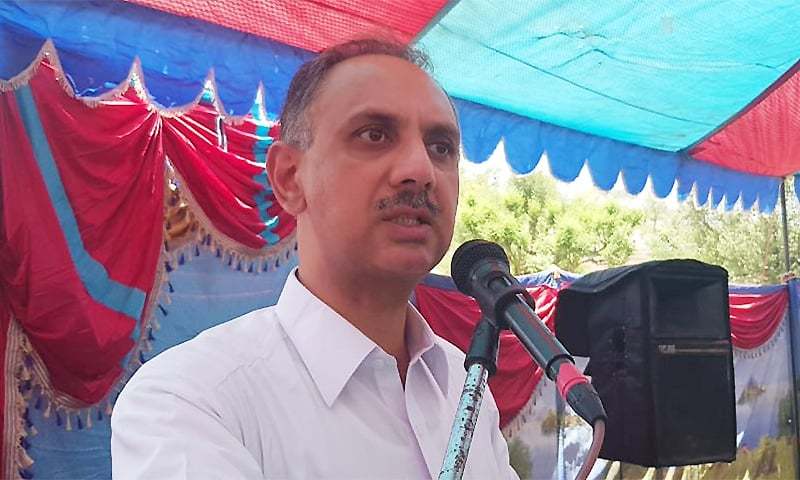ISLAMABAD: The government is planning to recover Rs300 billion from electricity “defaulters and thieves”, besides providing Rs50bn additional subsidy to exempt consumers using up to 300 units from tariff increase required under the International Monetary Fund programme.
The assertions were made by Energy Minister Omar Ayub at a press conference here on Friday. He said the government was also working to divide four of the larger power distribution companies into eight to improve their functioning and efficiency. Each of the Peshawar, Quetta, Multan and Lahore distribution companies would be divided into two so as to make them efficient and improve their service, he added.
Going forward, he claimed that the government aimed to bring the circular debt down from Rs450bn at present to zero by December 2020, adding that power companies had been able to recover Rs81bn from private defaulters over the past eight months of the current fiscal year and registered 30,000 FIRs for power theft with 4,000 arrests already made. Besides, he said, “stern departmental action” was being taken against officials of power companies for colluding on power losses.
Omar Ayub says crackdown on power theft launched, asks consumers to help identify thieves
The minister said these efforts were required to ensure that electricity tariff was not increased for consumers using 300 units per month. “We will set aside Rs230bn subsidy in upcoming budget to secure these consumers having 300 units or less per month consumption.”
He said the National Electric Power Regulatory Authority (Nepra) had recommended an increase of Rs3.84 per unit in tariff, but the Pakistan Tehreek-i-Insaf government passed on only Rs1.27 per unit to consumers and even then protected the domestic consumers using up to 300 units per month. This segment accounted for 75 per cent of total consumers, he said, adding that 95pc small commercial consumers were also exempted from tariff increase.
“The same policy will continue even under the IMF bailout package,” he said, adding that tariff increase for other consumer categories would be determined by Nepra. He claimed that there was zero loadshedding on 80pc feeders in the country.
For example, Mr Ayub said, the consumers who had been receiving electricity for only four hours under the Tribal Electric Supply Company (Tesco) were now being supplied electricity for 10-and-a-half hours and there was no loadshedding at the time of Iftar and Sehri. He said the previous government could not be given credit for this improvement because they did not have the will for improvement in the power sector. Instead, he added, they had left behind Rs650bn circular debt for the PTI government, including Rs450bn built during the last year of the Pakistan Muslim League-Nawaz government’s tenure to win elections.
The minister said the PML-N government started giving electricity to loss-making feeders to win elections that resulted in Rs450bn addition to the circular debt. He said the fresh accumulation of circular debt at present was Rs38bn per month that would be reduced to Rs26bn by June and Rs8bn by June 2020 to completely wipe out the problem.
“We have set the target to collect Rs100bn from defaulters and Rs200bn from those involved in power theft by June next year,” he said, adding that the power system losses had also been curtailed by 1.8pc since September last year.
The minister appealed to the masses to join hands in what he called a “Jihad against power theft” on the remaining 1,500 feeders that accounted for 20pc of the total feeders by identifying thieves.
He said one of the main reasons behind high circular debt was the adverse energy mix as the power sector was dependent on 60pc imported fuels. “We have embarked on a plan to reverse this by 2030,” he said, adding that the current share of renewable energy in total mix was just 4pc that would be increased to 20pc by 2025 and to 30pc by 2030.
Likewise, he added, the share of nuclear energy would be increased to 10pc so that with 20pc contribution from hydel total dependence on local resources could improve to at least 60pc. This would also help reduce foreign exchange, he said.
The minister said the government was working on introducing new two-way meters that would also be installed at transformers to address the issue of power theft. “The supply of electricity to any consumer involved in power theft will be suspended by pushing one button,” he said, adding that the Islamabad Electric Supply Company had floated tenders and the Gujranwala Electric Supply Company was also going to invite bids to procure such meters.
Mr Ayub said the government had also launched crackdown on the mafia involved in power theft. Power distribution companies had shortage of staff for patrolling, he said, adding that 950 to 1,000 appointments would be made on merit in power companies. He said the government would allow independent power producers to find out their own clients once their existing contracts came to an end and the government would not be bound to take electricity from them.
Published in Dawn, May 25th, 2019

















































